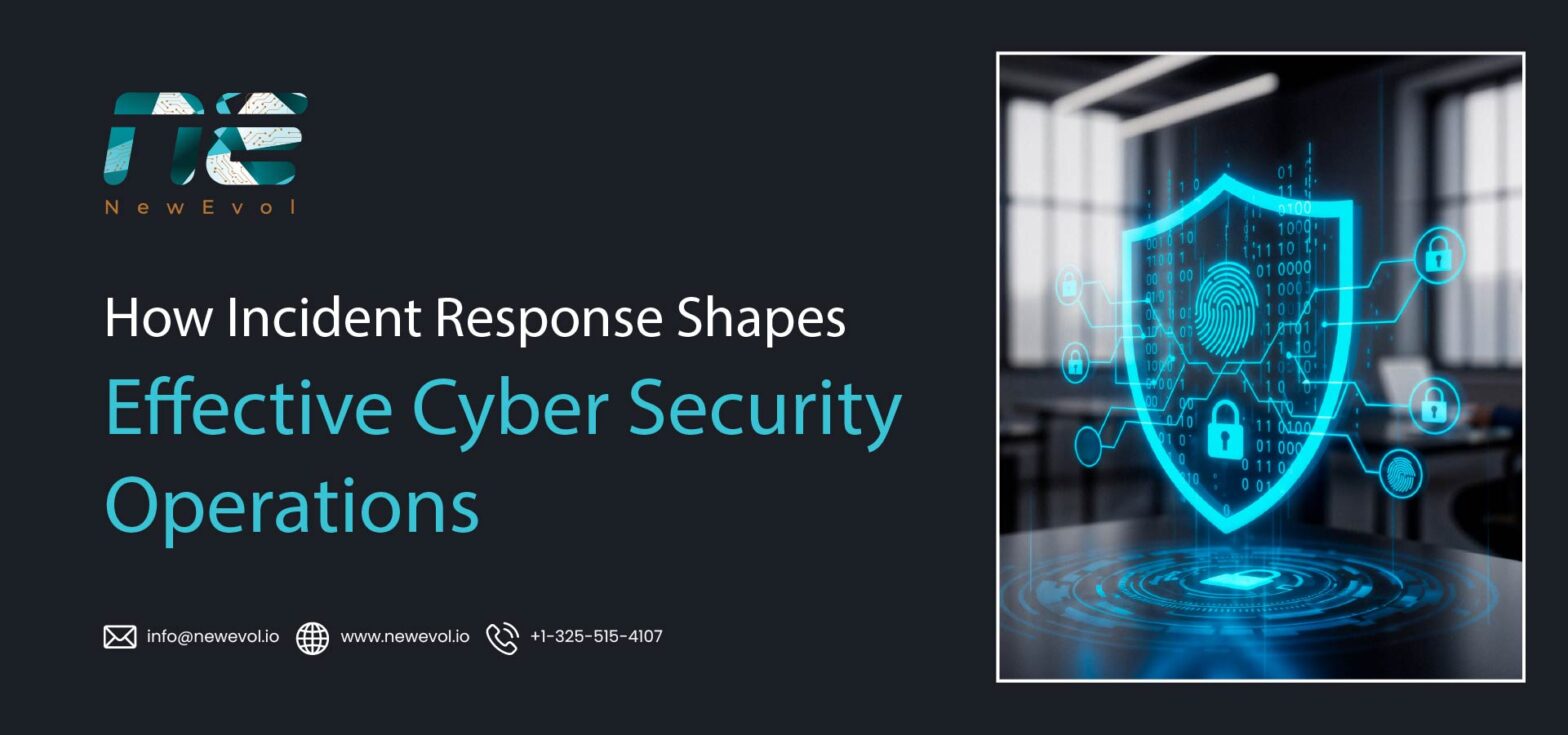How Incident Response Shapes Effective Cyber Security Operations

As the UAE rapidly advances its digital transformation across sectors like finance, healthcare, and government, the cyber threat landscape is evolving just as fast. From sophisticated ransomware attacks to targeted phishing campaigns, organizations face unprecedented risks that can disrupt operations, compromise sensitive data, and damage reputations.
In this high-stakes environment, Incident Response (IR) has become a critical component of effective cybersecurity operations. A well-prepared IR strategy enables organizations to detect, contain, and recover from incidents quickly, minimizing both financial losses and operational downtime. For UAE businesses, aligning Incident Response with national cybersecurity initiatives—such as the UAE National Cybersecurity Strategy and guidelines from the Telecommunications and Digital Government Regulatory Authority (TDRA) is essential for building resilience and maintaining stakeholder trust.
What is Incident Response?
Incident Response (IR) is a structured approach to identifying, managing, and mitigating cybersecurity incidents before they escalate into major crises. It ensures that organizations can respond quickly and effectively to threats, protecting both critical data and operational continuity.
A comprehensive IR framework typically follows six key phases:
- Preparation – Establishing policies, tools, and trained teams to handle potential incidents.
- Detection & Identification – Monitoring systems to recognize suspicious activity and classify incidents.
- Containment – Limiting the scope and impact of the incident to prevent further damage.
- Eradication – Removing the root cause of the incident, such as malware or unauthorized access.
- Recovery – Restoring affected systems and ensuring normal operations resume safely.
- Lessons Learned – Reviewing the incident to improve processes and prevent recurrence.
The global incident response market, valued at USD 46.8B in 2025, is projected to reach USD 109.9B by 2029, growing at a 23.8% CAGR, driven by rising cyberattacks, compliance needs, automation, and insider threat management.
By following these steps, organizations not only minimize disruption but also strengthen their overall cybersecurity posture, making them more resilient against future attacks.
The UAE Cybersecurity Landscape
The UAE has positioned itself as a regional leader in digital innovation, with extensive adoption of smart technologies across finance, healthcare, government, and energy sectors. However, this rapid digital growth has made organizations more vulnerable to cyber threats.
To address these challenges, the UAE government has implemented comprehensive cybersecurity measures. The UAE National Cybersecurity Strategy and the Telecommunications and Digital Government Regulatory Authority (TDRA) provide a regulatory framework that emphasizes proactive threat management, data protection, and resilience against cyberattacks.
Organizations in the UAE must navigate an increasingly complex threat environment, including ransomware, phishing, insider threats, and advanced persistent attacks. Aligning cybersecurity operations with national strategies and regulations is no longer optionality is essential for safeguarding critical assets, ensuring business continuity, and maintaining stakeholder trust.
Why Incident Response is Critical for UAE Organizations
Incident Response (IR) is more than just a reactive measure—it is a strategic necessity for UAE organizations aiming to maintain robust cybersecurity. Here’s why:
-
Legal and Regulatory Compliance
UAE businesses must comply with the Personal Data Protection Law (PDPL) and other sector-specific regulations. A well-defined IR process ensures timely reporting and mitigation of breaches, helping organizations avoid penalties and reputational damage.
-
Operational Resilience
Cyber incidents can halt business operations, impacting productivity and revenue. Effective IR enables quick containment and recovery, minimizing downtime and ensuring continuity.
-
Reputation Management
In an era where trust is a key differentiator, stakeholders expect organizations to respond decisively to security incidents. A robust IR plan demonstrates professionalism and builds confidence among clients, partners, and regulators.
-
Financial Protection
Beyond regulatory fines, cyber incidents can result in significant financial losses due to data theft, ransom payments, and operational disruption. Incident Response helps limit these costs by acting swiftly and efficiently.
By integrating Incident Response into their cybersecurity strategy, UAE organizations can protect assets, maintain compliance, and strengthen their resilience against evolving threats.
Best Practices for Building an Effective Incident Response Capability
Developing a strong Incident Response (IR) capability is essential for UAE organizations to stay ahead of cyber threats. Here are key best practices:
Develop a Comprehensive Incident Response Plan (IRP)
- Tailor the plan to address the organization’s specific risks, assets, and operational requirements.
- Clearly define roles, responsibilities, and communication channels during an incident.
Regular Training and Simulation Drills
- Conduct periodic tabletop exercises and real-world simulations to test readiness.
- Train staff to recognize threats, report incidents, and follow IR procedures effectively.
Leverage Advanced Technology
- Implement tools for real-time threat detection, automated response, and forensic analysis.
- Use Security Information and Event Management (SIEM) and Security Orchestration, Automation, and Response (SOAR) platforms to streamline incident handling.
Collaborate with Authorities and Industry Peers
- Engage with local law enforcement and regulatory bodies such as TDRA.
- Participate in threat intelligence sharing to stay updated on emerging threats and best practices.
By following these best practices, organizations can respond efficiently to incidents, minimize impact, and continuously improve their cybersecurity posture.
The Role of Technology in Modern Incident Response
Technology plays a pivotal role in modernizing Incident Response (IR) and enhancing the efficiency of cybersecurity operations. Key technological enablers include:
Artificial Intelligence (AI) and Machine Learning (ML)
- AI/ML systems can detect anomalies, identify potential threats, and predict attack patterns faster than manual monitoring.
- These technologies reduce response times and improve the accuracy of threat detection.
Security Orchestration, Automation, and Response (SOAR)
- SOAR platforms automate repetitive tasks, such as alert triage and incident documentation.
- Automation ensures consistent, rapid responses, freeing security teams to focus on critical decision-making.
Threat Intelligence Sharing
- Real-time collaboration with industry peers and government agencies helps organizations stay ahead of emerging threats.
- Sharing intelligence improves the overall security posture of organizations across sectors.
Advanced Monitoring and Analytics
- Continuous monitoring of endpoints, networks, and cloud environments allows early detection of suspicious activity.
- Analytics help prioritize incidents based on severity and potential impact, enabling focused mitigation efforts.
By integrating these technologies into IR strategies, UAE organizations can build proactive, agile, and resilient cybersecurity operations.
Case Studies: Lessons from the UAE
Examining real-world incidents in the UAE highlights the critical role of Incident Response (IR) in minimizing damage and strengthening cybersecurity operations.
Financial Sector Ransomware Attack
- Scenario: A mid-sized UAE bank experienced a ransomware attack targeting customer data and transaction systems.
- Response: The organization activated its IR plan, isolated affected systems, and collaborated with law enforcement and cybersecurity experts.
- Outcome: Operations were restored within 24 hours, data loss was minimized, and regulatory reporting was completed efficiently.
- Lesson Learned: Rapid containment and coordination with authorities can significantly reduce downtime and financial loss.
Healthcare Data Breach
- Scenario: A healthcare provider’s patient records were accessed due to a phishing campaign.
- Response: Incident Response teams identified the breach, revoked compromised credentials, and implemented enhanced monitoring.
- Outcome: Sensitive data exposure was limited, and future attacks were prevented through staff training and email security improvements.
- Lesson Learned: Continuous monitoring and staff awareness programs are critical for preventing recurring incidents.
Government Sector Cyber Disruption
- Scenario: A local government agency faced disruption due to a Distributed Denial-of-Service (DDoS) attack.
- Response: The IR team worked with network service providers to mitigate traffic and deployed automated defenses.
- Outcome: Public services remained operational, and the attack vector was documented to strengthen future defenses.
- Lesson Learned: Proactive preparation and leveraging automated tools ensure operational continuity even during large-scale attacks.
These cases underline that a structured and well-practiced Incident Response strategy is essential for UAE organizations to manage risks effectively and maintain trust with stakeholders.
How NewEvol Strengthens Incident Response for UAE Organizations
NewEvol’s AI-driven cybersecurity platform empowers UAE organizations to implement fast, efficient, and intelligent Incident Response (IR) strategies. By integrating with existing security infrastructure, NewEvol provides:
-
Real-Time Threat Detection
Advanced monitoring and analytics detect anomalies across endpoints, networks, and cloud environments, ensuring threats are identified before they escalate.
-
Automated Response and Orchestration
With Security Orchestration, Automation, and Response (SOAR) capabilities, NewEvol accelerates incident containment, reduces manual errors, and frees security teams to focus on strategic priorities.
-
Comprehensive Incident Management
From detection to recovery, NewEvol streamlines the entire IR lifecycle, providing clear workflows, automated documentation, and actionable insights.
-
Compliance and Reporting
NewEvol assists organizations in meeting UAE regulatory requirements such as the Personal Data Protection Law (PDPL), enabling timely reporting and audit-ready incident records.
By leveraging NewEvol, UAE businesses can build a proactive cybersecurity posture that minimizes risk, enhances operational resilience, and ensures business continuity in the face of evolving cyber threats.
Conclusion
In the UAE’s rapidly evolving digital landscape, cybersecurity is no longer just a technical concern—it is a business imperative. A robust Incident Response (IR) strategy enables organizations to detect, contain, and recover from cyber threats swiftly, protecting critical data, ensuring operational continuity, and maintaining stakeholder trust.
By integrating IR into their cybersecurity operations, businesses can move from reactive defense to proactive resilience. Regularly updating response plans, conducting training exercises, and leveraging advanced technologies like AI, ML, and SOAR are essential steps in building a culture of preparedness.
Investing in Incident Response today not only safeguards against potential losses but also strengthens long-term organizational resilience, positioning UAE enterprises as leaders in secure and reliable digital operations.
FAQs
1: Why is incident response important in cybersecurity?
It helps organizations quickly detect, contain, and recover from cyber incidents, minimizing damage, financial loss, and reputational impact.
2: What is the incident response process in cybersecurity?
The process includes six key phases: Preparation, Detection & Identification, Containment, Eradication, Recovery, and Lessons Learned.
3: What is the role of an incident response team in cybersecurity?
The team manages incidents from detection to recovery, coordinates actions across departments, and ensures compliance with regulations.
4: How can you ensure the effectiveness of an incident response plan?
Regularly update the plan, conduct simulation drills, train staff, leverage advanced detection and automation tools, and review lessons learned after each incident.

